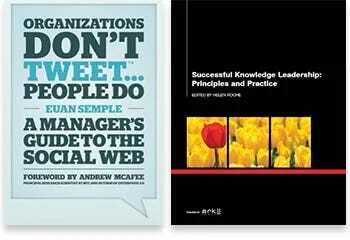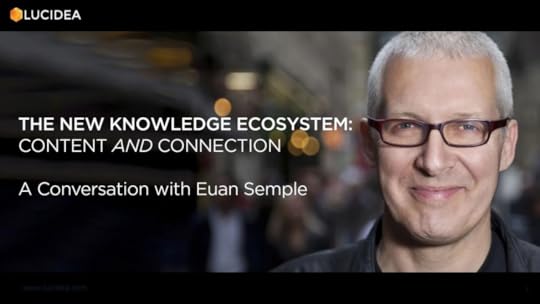Knowledge Management Thought Leader 121: Euan Semple

Euan Semple has been a leader and influencer in the ever-changing field of digital technology for three decades. An early adopter of social media, he implemented one of the first enterprise social network (ESN) systems inside the BBC. He also ran BBC DigiLab, a department whose purpose was to help the BBC understand new technologies across the range of its activities and make better decisions about their use and implementation.
Euan left the BBC in 2006 to establish his own consultancy and help clients stretch their thinking about digital transformation in all its forms — and to ensure that they end up doing the right things for the right reasons.
His specialties include knowledge management, social computing, blockchain, artificial intelligence, automation, informal learning, weblogs, wikis, forums, social networking applications, social business, culture change, leadership, communication, intranets, ESNs, internal communications, and public relations.
Here are definitions for five of Euan’s specialties:
Blogs : Websites where posts are made (such as entries in a journal or diary), displayed in a reverse chronological order. Often provide commentary or news on a particular subject. Some function as personal online diaries or logbooks. Combine text, images, and links to other blogs and websites. Typically provide archives in calendar form, local search, syndication feeds, reader comment posting, trackback links from other blogs, blogroll links to other recommended blogs, and categories of posts tagged for retrieval by topic. Enterprise Social Networks : Internal, private social networking platforms used for communications and collaboration within an organization. Threaded Discussions: tools for carrying on conversations among community members on a specific subject, including online and email posts and replies, searchable archives, and discussions grouped by threads to show the complete history on each topic. Intranets : Private computer networks that use Internet protocols, network connectivity, and the public telecommunication system to securely share part of an organization’s information or operations with its employees. Social Business : The use of Enterprise Social Networks, blogs, wikis, video sharing sites, podcasts, mashups, tags, tag clouds, pins, ratings, and folksonomies within an enterprise. Wikis : Websites that allow any user to easily add, remove, edit, and change most available content. Wikis are effective for collaborative writing, self-service web page creation, and shared maintenance of information. Anyone can edit a wiki page; links and new pages are automatically generated, and there is a revision history that lists all previous versions, with the ability to undo changes and revert to a prior version.Euan created the following content. I have curated it to represent his contributions to the field. For more about Euan, see Profiles in Knowledge.
Books by Euan Semple The Power of Networks: A Conversation with Euan Semple
The Power of Networks: A Conversation with Euan SempleEuan partnered with Lucidea for this KM classic: The New Knowledge Ecosystem: Content and Connection. It’s an oldie that holds a lot of its value. Watch the recording to see for yourself!
 The Three Cs
The Three CsI recently wrote a post about the potential for systems to be self-organizing and the way that we compromise this ability by attempting to exercise control over the world around us. In order for systems to become self-organizing the networks that make them up have to be comprised of healthy cells. It occurred to me that in order to become healthy the cells need to be encouraged to work on the following three characteristics.
1. Curiosity: Wondering why things are the way they are. A willingness to relax their grip on fixed ideas and to consider alternatives. An inclination to tinker. This is what allows kids to adopt new technology so quickly. We have driven curiosity and playfulness out of the workplace in our attempts to be “businesslike” and in the process have compromised our collective ability to adapt and be effective.
2. Critical thinking: Constantly thinking about where information is coming from, who are its sources, and who has vested interests in its propagation. Working out the likely truth of the things we consume measured against our other experiences and with a healthily skeptical attitude. Considering the consequences of onward sharing of the information we take in.
3. Conversation: Adopting a more conversational tone in how we share ideas and discuss the world around us. Avoiding dogma and dogmatic attitudes. Engaging in a to and fro with equals. Recognizing that we are conversing with another human being who shares our challenges and is also struggling to make sense of the world. This last principal needs to be applied just as much online as off.
These three Cs are just as important as the traditional three Rs and we should consider teaching them in school.
Social Networks are All About Finding StuffA question from Dave Snowden (“In your opinion, what’s the best tool for semantic search and representation?”) about what I thought the best semantic search tool was and my rather facetious response “the meatware” reminded me of something I am more and more convinced of. Social networks are about finding stuff. Finding documents, finding people, even finding human contact.
I have often said that the best search engine is other people’s collective memory. When people ask on a forum where to find a previous answer tell them to ask the question again. Users will almost certainly remember the question being asked and will point to the previous answer. If you are lucky, and ask the question well, you may even get pointers to various answers any or all of which could be useful. If you are really lucky you will kick off new exploration of the subject and unearth new and more current information.
Social media is making this ubiquitous access to an outboard brain more obvious to more people and there has even been talk of it replacing Google for some. The point is you can only do this if you have a high quality network of people doing the filtering and collective noticing for you. Building up these networks, and building “credit” by helping others, will become key skills and the people who invest the effort will find the better stuff faster.
Ten Ways to Create a Knowledge EcologyA tweet yesterday prompted me to remember sage advice from Dave Snowden which I took to heart in my work with social tools at the BBC. “You can’t manage knowledge but you can create a knowledge ecology”. I thought it might be useful to others to list the ten most important things I learned about doing this.
Have a variety of tools rather than a single system. Not everyone sees the world the same way or has the same needs so mixing up different tools with different strengths allows people to find one that works for them. Avoid single platforms like the plague.Don’t have a clear idea where you are headed. The more fixed you are in your aspirations for your ecology the less likely you are to achieve them. Be prepared to go where people’s use of the tools takes you and enjoy the ride.Follow the energy. Watch where the energy in the system is and try to copy the factors that generated it. Get others interested in why energy emerges and they will want some of it themselves.Be strategically tactical. You can have an overall strategy of behaving in certain ways depending on how your ecology develops. It is possible to sell this as a strategy to those who need strategies.Keep moving, stay in touch, and head for the high ground. Keep doing things, keep talking about what you are doing and why, and have a rough idea of where the high ground is.Build networks of people who care. Don’t try to manage your ecology by committee but cultivate communication and trust between those who care that it works and have the commitment to do something about it — whoever they are and whatever their role.Be obsessively interested. Notice everything that happens and consider why. Tell great stories about what you are observing.Use the tools to manage the tools. Blog about what is going on with your corporate blogging, ask questions in your forum about security, tweet when something is changing in your ecology and ask people why it is interesting.Laugh when things go wrong. If you are pushing limits and exploring new territory things will occasionally blow up in your face. Having a sense of humour and enjoyment of the absurd will help you stay sane.Unleash Trojan Mice. Don’t do big things or spend loads of money. Set small, nimble things running and see where they head.[image error]


